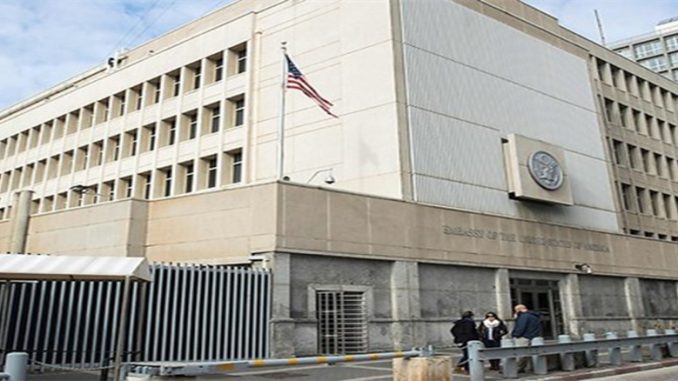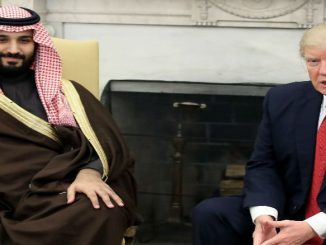
Fatah spokesperson Ziad Khalil Abu Zayyad warned that relocating the US embassy in Tel Aviv to Jerusalem would “explode the situation” in the entire Middle East and North Africa region, in response to a US congressional delegation that reportedly arrived to Israel aiming to study the possibility of the move.
Israeli media reported Friday that right-wing Israeli lawmaker Yehuda Glick released a statement saying that the delegation, lead by Republican Congressman Ron DeSantis, would arrive in Israel on Saturday evening in a visit to last until Sunday.
In a statement released Saturday night, Zayyad warned that the US Congress “should understand that moving the US embassy to Jerusalem will not only explode the situation in Palestine but the whole Mena (Middle East and North Africa) region.”
While US President Donald Trump’s campaign promise to move the embassy has been reiterated a number of times since his election, the Trump administration said at the end of January that it was still “too early” to discuss the issue, and that details would be announced “soon.”
Abu Zayyad condemned the proposed relocation in his statement, and suggested that the congressional delegation consult with its military and political consultants in the US State Department, “(who have) stated several times in the past that such actions put American interests and presence in the region in danger.”
Republican senators Ted Cruz (Texas), Dean Heller (Nevada), and Marco Rubio (Florida) introduced a bill to the US Congress in January to recognize Jerusalem as Israel’s undivided capital and move the US embassy there from Tel Aviv, defying international stances on the decades-old Israeli-Palestinian conflict resting on a two-state solution.
If implemented, the bill would give legitimacy to Israel’s illegal occupation of East Jerusalem since 1967, disregard Palestinian claims to the city, and terminate a longstanding White House policy to perpetually defer a 1995 congressional decision to recognize Jerusalem as the Israeli capital and move the embassy there.
Palestine Liberation Organization (PLO) Secretary-General Saeb Erekat has warned that the PLO would revoke all previously signed agreements with Israel as well as the PLO’s 1993 recognition of Israel if Trump followed through on his pledge to move the embassy, further warning that “any hope of peace in the future will just vanish,” if the decision was implemented.
According to Glick, a member of the ruling Likud party in Israel’s parliament, the Knesset, the congressional delegation’s visit aimed to “closely examine the issue of transferring the US embassy from Tel Aviv to Jerusalem — both from a practical standpoint as well as politically.”
Glick added that he would also brief the delegation about the “unique history and political reality of Jerusalem, past and present,” and that the members of the delegation will meet with Israeli Prime Minister Benjamin Netanyahu and explore potential sites to house the embassy, so that the delegation may return to the U.S. “with an accurate analysis of the matter, in order to update the US administration and Congress.”
Glick, a right-wing, American-born rabbi rose to prominence for leading groups of rightist Israelis into occupied East Jerusalem’s Al-Aqsa Mosque for worship, in contravention of an agreement between Israel and the Islamic endowment since 1967 which prohibits non-Muslim prayer in the compound. In 2014, Glick reportedly assaulted a Palestinian woman while touring the holy site, although an Israeli court lately dropped the indictment against him.
The fate of Jerusalem has been a focal point of the Israeli-Palestinian conflict for decades, with numerous tensions arising over Israeli threats regarding the status of non-Jewish religious sites in the city, and the “Judaization” of East Jerusalem through settlement construction and mass demolitions of Palestinian homes.
While members of the international community have rested the solution to the Israeli-Palestinian conflict on the discontinuation of illegal Israeli settlements and the establishment of a two-state solution, Israeli leaders have instead shifted further to the right as many Knesset members have called for an escalation of settlement building in the occupied West Bank, and with some having advocated for its complete annexation.
A number of Palestinian activists have criticized the two-state solution as unsustainable and unlikely to bring durable peace, proposing instead a binational state with equal rights for Israelis and Palestinians.



